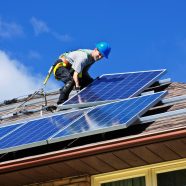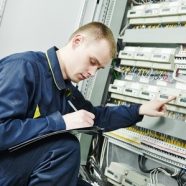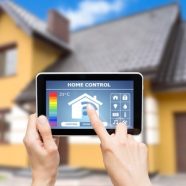Going Green: How Solar Panels Work
It has become a common sight in the Sunshine State, to see solar panels on the roofs of homes and businesses. After all, with all that sunshine, it makes sense to take advantage of the energy savings and energy efficiency benefits that going fully or partly off grid offers, and what better way than to harvest sunshine!
Whether you’re interested in green building in general, or just considering retrofitting your home with solar panels to take advantage of energy savings and lower utility bills, you might have wondered how it all works. So we decided to give you the short and simple version of how solar panels work, and here it is.
Solar Panel Basics
The solar panels that power homes and businesses are known as photovoltaic or PV panels. There are other types of solar panels, such as thin film, and other methods of collecting solar energy like parabolic troughs, but if you’re going off grid, it’s PV panels that will do the work for you.
Solar panels work by creating an electrical field, by sandwiching two layers of silicon together, and by treating each of those layers to manipulate them into having a particular charge. The top layer will be treated with phosphorous, to add electrons, and create a negative charge, while the bottom gets added boron, which removes electrons, and creates a positive charge.
With the electrical field established, photons from sunlight can “knock electrons loose” and those electrons are then collected, and become electricity.
The Complicated Stuff
When you look at PV solar panels in such a basic, fundamental way, it can be difficult to understand why it costs so much to convert your home, get energy savings and conserve energy. However, there is a lot more to a solar power system for a building than just the panels (and even those are complex to design and manufacture.)
First, there’s the issue of the type of power that has been generated. Our homes run on what is known as AC, or Alternating Current, but the power that comes from a PV panel is DC, or Direct Current. Since the two don’t mix, the first thing that needs to happen is to use a piece of equipment called an inverter to convert the DC current into usable AC power.
There’s usually also a piece of equipment called a regulator installed early on in the solar power system. This piece of equipment helps to ensure that the power from your solar panels isn’t too much for your batteries or panel to handle.
Next, there are usually batteries, which are typically deep cycle batteries, which store the electrical power collected by the solar panels, since there is no power generated at night, and your home will still need to have power when it’s dark!
Finally, there’s the connection to your electrical panel, utility meter, and in some cases, the main grid.
Solar panels also need to be carefully oriented to collect sunlight efficiently, and there are many other considerations that need to be made. In short, while the principles of solar power are not too complicated, the systems can be, and if you’re thinking about going off grid, it’s always a good idea to talk to an electrical contractor who has some experience!
Read MoreWhat Does It Take to Become a State-Certified Electrical Contractor?
In the U.S. becoming a commercial electrical contractor is a multi-step process that requires study, practical experience, and various licensing exams. That’s a good thing too, because contractors literally work with something (electricity) that has the power of life and death. No one would let an unqualified surgeon perform surgery, and the same goes for our homes. Throughout the U.S. we’re choosy about who we allow to work with electrical power, and that’s a very good thing.
Various Types of License
Many people don’t realize that there is more than one kind of license for electrical contractors in Florida. These include:
- Electrical Contractor (Certified or Registered)
- Alarm Contractor I (Certified or Registered)
- Alarm Contractor II (Certified or Registered)
- Electrical Specialty Contractor (Certified or Registered)
Among the specialties that contractors can choose to be licensed for are:
- Residential Electrical Specialty
- Utility Line Specialty
- Lighting Maintenance Specialty
- Sign Specialty
- Limited Energy Specialty
Each of these types of license has slightly different requirements, and just because a contractor is licensed in one area, that does not mean that they can work in all areas of electrical installation, maintenance or repairs.
General Requirements for Licensing
Even though there are slightly different requirements for the different types of contractor licenses in Florida, there are a few basic criteria that each contractor will need to fulfill, regardless of their area of expertise and focus. These include:
- They must meet the minimum study requirements for licensing.
- They must meet the minimum experience requirements for the type of licensing they are seeking.
- They must pass the relevant exams, which may include industry specific exams as well as exams about business practices and other topics.
- They must maintain the minimum contractor’s insurance for their area of specialty at all times.
- Contractors will often undergo credit checks, and they will be required to meet minimum continuing education requirements.
As you can see, there’s a lot that goes into becoming an electrical contractor in Florida, whether you specialize in residential installations, commercial electrical, electrical maintenance or any other field.
As a company, like most professional electrical contractors in the State of Florida, we’re glad that these regulations are in place, because they help to ensure that customers who use licensed contractors can expect to get the appropriate electrical protection in West Palm Beach that we would want in our own homes.
When you work with a licensed electrical contractor, you can be sure that they know the business, that they have experience in the field, and that they have the documentation necessary to certify your installation, and the insurance to protect you if something goes wrong.
Always Choose a Licensed Contractor
Licensed electrical contractors have to go through a long process and jump through many hoops to get and stay licensed. That usually reflects in the rates they charge, although there are many out there that offer reasonably priced service and great value for money.
If there’s one piece of advice we can offer any potential customer, however, it is to always choose a licensed contractor. Even if someone who is not licensed offers to do a job for you at a great price, and you’re tempted, remember that unlicensed contractors cannot perform legal electrical installations, repairs or maintenance. More importantly, if you don’t use a licensed contractor, and a failure in their installation or electrical protection measures results in a fire or any other damage, you might not be covered by your insurance policies.
Just save yourself the trouble, and hire a professional. They’ll get the job done right, and you’ll have peace of mind.
Read MoreGizmos and Gadgets: How Smart Home Trends Are Changing Electrical Installations
At one time, if you did residential electrical in South Florida, you knew exactly what to expect. New construction electrical was pretty much the same, with a few variations in size and quantity of outlets, perhaps a bigger panel, and a few other minor differences. Those days are rapidly becoming a thing of the past, and the demand for smart home electrical systems to support a wide range of technologies is becoming much more common.
So far, there are a few contractors who have embraced this change, but much of the industry seems divided on whether these changes are good or bad.
Having been working in residential electrical in South Florida for some time, and in commercial and electrical maintenance, we’ve been watching these changes closely, and we’re excited about the possibilities.
What Sort of Changes Are We Seeing?
The term “smart home” really means networked home. Homes where lighting, blinds, music and entertainment systems and more are centrally controlled through an app or interface. On the surface, that all seems to happen as if by magic, but the reality is, there’s a lot more wiring and communications cables going into the walls of our homes. There’s additional power required for the equipment that makes the magic happen, panels typically need to be more complex and larger to accommodate the additional equipment required to run your home.
How Your Residential Electrical South Florida Installation Will Change
Whether your residential electrical South Florida contractor installs smart home equipment for you, or whether there’s another company taking care of that aspect of your new home, there will be changes to the wiring and electrical that will need to be made.
Additional cabling may be necessary, changes to the panel to cope with additional electrical requirements, additional outlets or junction boxes, and even changes to the types of lighting, because not all lighting is suitable for smart home system operation.
Whether your electrical contractor is taking care of the smart home equipment or not, there will be more planning involved too, since all the wiring and equipment will need to be in place before the walls of your home can be finished.
Choosing the Right Contractors
Perhaps the biggest change that smart homes are making in the electrical world is that it has become more important than ever to hire the right contractors for the job. With far more power now required to run your home, and a lot more equipment to safely install, electrical protection and careful planning has become more important than ever.
Integrating the various systems and elements is another factor, and if you are planning to build smart home technology into your new home or a renovation (even a very old home!), you definitely want to work with an experienced company, who can get the job done safely and on time, and who are good at working with any other specialists you bring on board.
The fact is, smart homes are the way of the future, and there are only going to be more gizmos and gadgets behind your walls in years to come. Make sure that the power and wiring that supports those gizmos is up to the job, and you’ll enjoy them all the more.
Read More4 Real World Electrical Disaster Stories
When you work in commercial electrical, and you pride yourself on attention to detail, quality installations and top notch electrical maintenance, you usually don’t want to think about electrical disaster stories. However, every once in awhile, it helps to look at real world examples of what can happen when you don’t do the right thing, or when you fail to take steps to ensure electrical protection. So here are a few electrical disaster stories that should give you food for thought!
1. Thomas Edison Sets Vanderbilt Parlor Alight, 1879
We might remember him as one of the greatest inventors who ever lived, but that doesn’t mean Thomas Edison didn’t make mistakes along the way. In 1879, he was asked to provide electric lighting in the Vanderbilt parlor. Since William Henry Vanderbilt was a wealthy benefactor, Edison obliged, but a wiring error lead to electricity being discharged into the wallpaper, which contained a conductive metal thread. The result was a fire that virtually destroyed the parlor!
2. Iroquois Theatre Fire, Chicago, December 30, 1903
Not long after electricity became a common fixture in buildings in the U.S., a stage light in the back of the theater overheated, ignited a velvet curtain, and started a fire that would eventually kill 602 people, making it the deadliest single building fire in U.S. history.
The accident can be attributed to poor fire safety, early lighting that overheated quickly, and the lack of emergency lighting to light the way out for victims.
3. New London School Explosion, Texas, March 18, 1937
The New London School Explosion was caused by a natural gas leak. More precisely, it was caused by a gas leak that came into contact with a bad electrical connection, causing the gas to ignite, and causing the structure to collapse. The estimated fatality count ranges from 296 to 319, depending on which source you consider more accurate.
Explosions like these lead to changes in how natural gas is supplied and used, but also highlighted the importance of safe, spark free electrical in homes that do use gas for heating and other purposes.
4. MGM Grand Hotel Fire, Las Vegas, November 21, 1980
Proof that electrical disasters weren’t relegated to the early days of electrified buildings, the MGM Grand Hotel in 1980 was caught in a conflagration that started with an electrical fire, was fed by PVC pipes and other synthetic materials, tore through 26 floors, killed 87 and injured more than 700. This accident was proof that even on large, high profile buildings, mistakes with electrical systems could be catastrophic.
Learn from the Past
One of the most important things disasters like these, and others, have taught us is that while electricity can power our lives, and is a critical part of civilization, it’s also very dangerous, with the potential to do severe damage.
It is absolutely critical that we learn from the mistakes of the past, and design electrical systems and installations for the future with better electrical protection methods in place, to ensure that residential and commercial electrical is safer for everyone.
Read More




Recent Comments